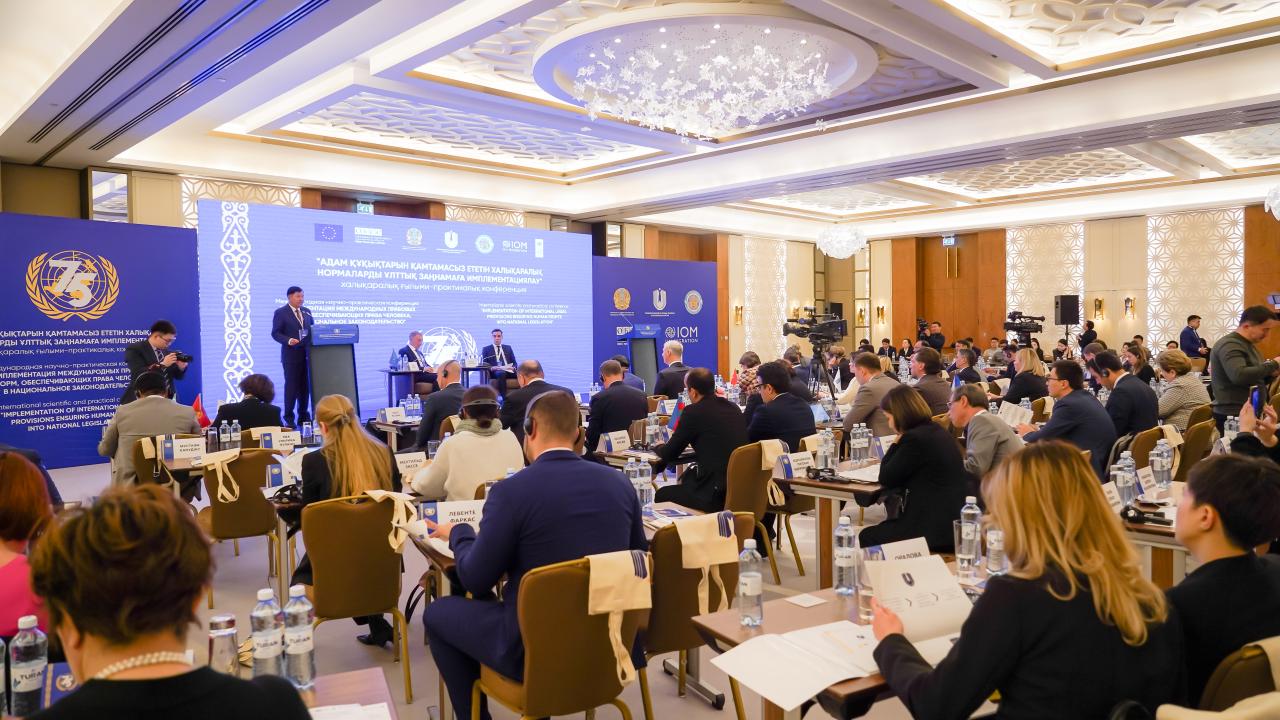ASTANA – Key representatives of government and human rights protection institutions have addressed Kazakhstan’s efforts in implementing human rights and key insights during the international scientific and practical conference organized by the Human Rights Commissioner’s Office on Dec. 7 in Astana.

Photo credit: gov.kz.
The two-day conference chaired by Kazakhstan’s Human Rights Commissioner Artur Lastayev precedes a milestone event – the 75th anniversary of the adoption of the United Nation’s (UN) Universal Declaration of Human Rights, celebrated as Human Rights Day on Dec. 10.
“Our forum is held in support of the UN’s Human Rights 75 global initiative, which has three key objectives. The first is to build a new consensus on the universality and indivisibility of human rights under the theme of ‘all rights for all.’ The second is to develop a vision for the future by reflecting on potential breakthroughs, innovations and new challenges for human rights in the next 25 years. And third, to strengthen the human rights ecosystem by building trust, expanding resources, including the development of human rights mechanisms,” said Lastayev.
Outlining the changes implemented in the past year, Constitutional Court Chairwoman Elvira Azimova mentioned the adoption of the law on public control, which involves the creation of a regulatory institute of petitions aimed to increase civil society participation in state management and the openness of the activities of state bodies.
According to her, the advancements made over the past year emphasize the need to continue the work. Thus, the Parliament is discussing draft laws on combating human trafficking and criminalization of domestic violence.
Addressing Kazakhstan’s efforts in human rights implementation, Supreme Court Chairman Aslanbek Mergaliyev said Kazakhstan is “systematically working to incorporate international human rights standards into national legislation.”
He expressed Kazakhstan’s firm commitment to these values. The nation is a full party to over 70 multilateral treaties in this area.
“To democratize the judicial system and increase civic participation in the administration of justice, the categories of cases to be tried by jury have been gradually expanded by order of the President. Administrative justice has been in operation for two and a half years. During this time, it has shown its effectiveness in protecting citizens’ rights and legitimate interests against unlawful actions by state agencies. Today the percentage of citizens winning against the state exceeds 60%,” added Mergaliyev.
UN Resident Coordinator in Kazakhstan Michaela Friberg-Storey highlighted the significance of participating in the Universal Periodic Review (UPR), a process that involves a periodic review of the human rights records of all 193 UN member states.
“It plays a pivotal role as through the UPR countries undergo regular reviews of their human rights records. They receive recommendations for improvement and dialogue with multilateral partners. Kazakhstan will report on its current cycle of UPR in 2024, and have a new session in 2025. This is a golden opportunity to advance the human rights work throughout Kazakhstan,” said Friberg-Storey.
“Countries that uphold human rights tend to experience a more robust and sustainable development. Therefore, I urge legislators to use the UPR as a platform for consideration of priorities,” she added.
Minister of Justice Azamat Yeskaraev noted that the ministry is preparing for the next defense of the UPR. “Kazakhstan’s interim information on the implementation of the UPR recommendation has been sent to the UN. The ongoing political reforms in the country have proven to be consistent with the implementation of the human rights recommendation,” he said.
He said the ministry with other government agencies is working on the phased introduction of national indicators for assessing human rights compliance. They are based on 14 global indicators, five of which were developed by the UN Office of the High Commissioner for Human Rights and their integration with sustainable development goals.
Deputy Foreign Minister Roman Vassilenko addressed the conference participants, reviewing Kazakhstan’s human rights advancement, which is closely linked to political modernization.
“The rule of law and the protection of human rights constitute the firm values of all reforms being carried out in the country. The direct election of district and city akims (mayors) for the first time this year marks a pioneering and democratic practice in Central Asia. The introduction of the proportional-majoritarian model in the recent parliamentary elections in March allowed for the participation of self-nominated candidates and ensured the presence of a wide range of parties and, consequently, opinions in parliament,” Vassilenko said.
He also spoke about the significant strides made by Kazakhstan to promote gender equality.
“The list of jobs that limit the use of women’s labor has been abolished, and mandatory parliamentary quotas for women, the disabled, and youth have been increased to 30%. A national action plan has been adopted to implement UN Security Council Resolution No. 1325 on Women, Peace and Security,” said Vassilenko.

